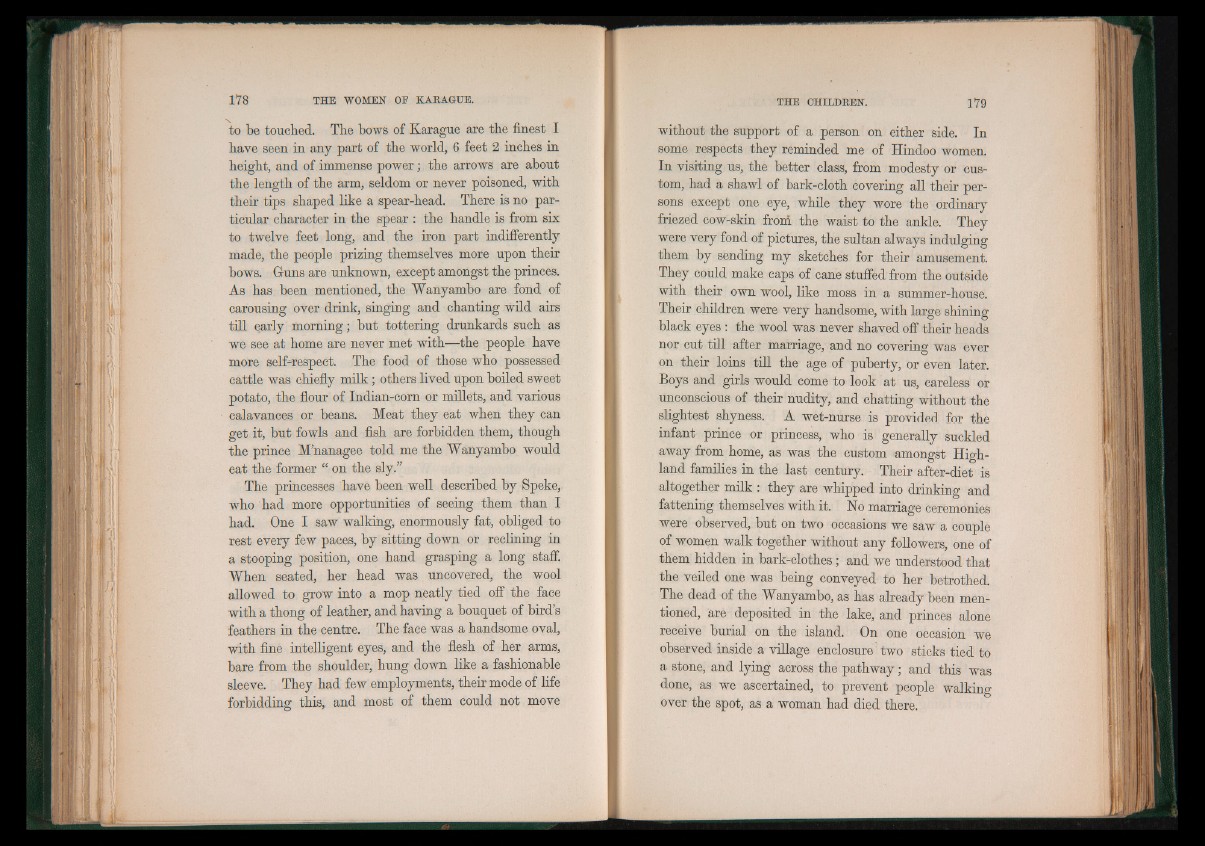
to be touched. The bows of Karague axe the finest I
have seen in any part of the world, 6 feet 2 inches in
height, and of immense power; the arrows are about
the length of the arm, seldom or never poisoned, with
their tips shaped like a spear-head. There is no particular
character in the spear : the handle is from six
to twelve feet long, and the iron part indifferently
made, the people prizing themselves more upon their
bows. Guns are unknown, except amongst the princes.
As has been mentioned, the Wanyambo are fond of
carousing over drink, singing and chanting wild airs
till early morning; but tottering drunkards such as
we see at home are never met with—the people have
more self-respect. The food of those who possessed
cattle was chiefly milk ; others lived upon boiled sweet
potato, the flour of Indian-corn or millets, and various
calavances or beans. Meat they eat when they can
get it, but fowls and fish are forbidden them, though
the prince M’nanagee told me the Wanyambo would
eat the former “ on the sly.”
The princesses have been well described by Speke,
who had more opportunities of seeing them than I
had. One I saw walking, enormously fat, obliged to
rest every few paces, by sitting down or reclining in
a stooping position, one hand grasping a long staff.
When seated, her head was uncovered, the wool
allowed to grow into a mop neatly tied off the face
with a thong of leather, and having a bouquet of bird’s
feathers in the centre. The face was a handsome oval,
with fine intelligent eyes, and the flesh of her arms,
bare from the shoulder, hung down like a fashionable
sleeve. They had few employments, their mode of life
forbidding this, and most of them could not move
without the support of a person on either side. In
some respects they reminded me of Hindoo women.
In visiting us, the better class, from modesty or custom,
had a shawl of bark-cloth covering all their persons
except one eye, while they wore the ordinary
friezed cow-skin from the waist to the ankle. They
were very fond of pictures, the sultan always indulging
them by sending my sketches for their amusement.
They could make caps of cane stuffed from the outside
with their own wool, like moss in a summer-house.
Their children were very handsome, with large shining
black eyes : the wool was never shaved off their heads
nor cut till after marriage, and no covering was ever
on their loins till the age of puberty, or even later.
Boys and girls would come to look at us, careless or
unconscious of their nudity, and chatting without the
slightest shyness. A wet-nurse is provided for the
infant prince or princess, who is generally suckled
away from home, as was the custom amongst Highland
families in the last century. Their after-diet is
altogether milk : they are whipped into drinking and
fattening themselves with it. No marriage ceremonies
were observed, but on two occasions we saw a couple
of women walk together without any followers, one of
them hidden in bark-clothes; and we understood that
the veiled one was being conveyed to her betrothed.
The dead of the Wanyambo, as has already been mentioned,
are deposited in the lake, and princes alone
receive burial on the island. On one occasion we
observed inside a village enclosure two sticks tied to
a stone, and lying across the pathway; and this was
done, as we ascertained, to prevent people walking
over the spot, as a woman had died there.